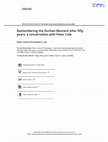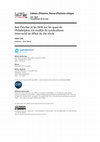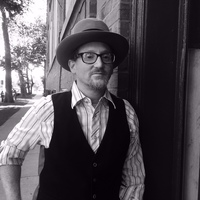Books by Peter Cole
A powerful historical novel about the ILWU in 1980 refusing to load weapons bound for the militar... more A powerful historical novel about the ILWU in 1980 refusing to load weapons bound for the military dictatorship in El Salvador. Written by Herb Mills, a San Francisco union officer who helped lead this campaign. While Mills wrote this story as a novel, it's basically autobiographical. There's never been a more timely story than this one, showing workers standing up for justice and putting their jobs on the line.
The author passed away in 2018 but asked me, 5 years earlier, to finish his novel. I helped edit Presente and found it a publisher.

PM Press, 2021
In the early twentieth century, when many US unions disgracefully excluded black and Asian worker... more In the early twentieth century, when many US unions disgracefully excluded black and Asian workers, the Industrial Workers of the World (IWW) warmly welcomed people of color, in keeping with their emphasis on class solidarity and their bold motto: “An Injury to One Is an Injury to All!” Ben Fletcher: The Life and Times of a Black Wobbly tells the story of one of the greatest heroes of the American working class.
A brilliant union organizer and a humorous orator, Benjamin Fletcher (1890–1949) was a tremendously important and well-loved African American member of the IWW during its heyday. Fletcher helped found and lead Local 8 of the IWW’s Marine Transport Workers Industrial Union, unquestionably the most powerful interracial union of its era, taking a principled stand against all forms of xenophobia and exclusion.
For years, acclaimed historian Peter Cole has carefully researched the life of Ben Fletcher, painstakingly uncovering a stunning range of documents related to this extraordinary man. Ben Fletcher: The Life and Times of a Black Wobbly is the most comprehensive look at Fletcher ever to be published. It includes a detailed biographical sketch of his life and history, reminiscences by fellow workers who knew him, a chronicle of the IWW’s impressive decade-long run on the Philadelphia waterfront in which Fletcher played a pivotal role, and nearly all of his known writings and speeches, thus giving Fletcher’s timeless voice another opportunity to inspire a new generation of workers, organizers, and agitators. This revised and expanded second edition includes new materials such as facsimile reprints of two extremely rare pamphlets on racism from the early twentieth century, more information on his prison years and personal life, additional recollections from friends, greater consideration of Fletcher from a global perspective, and much more.
Robin D.G. Kelley contributed a Foreword
University of Illinois Press, 2018
University of Illinois Press, 2007
Charles H. Kerr Press, 2007
Scholarly articles and book chapters by Peter Cole

Safundi, 2023
The Durban Moment—a term coined by the literary critic Tony Morphet (1940–2021), who taught at th... more The Durban Moment—a term coined by the literary critic Tony Morphet (1940–2021), who taught at the University of KwaZulu-Natal—remains one of the more storied episodes in South Africa’s political history after 1948. Capturing the convergence of political dynamics in the Durban area during the early 1970s, the expression has been both narrowly and broadly defined. Traditionally, it has referred to the conjuncture of three elements: the massive Durban Strikes of 1973, sparked in part by a dockworker strike in late 1972, which revived the long tradition and history of Black trade unionism and labor movements in South Africa; the rise of Steve Biko (1946–77) and the escalation of Black Consciousness as a new ideology of resistance; and the utopian humanism of the white philosopher-activist Richard (Rick) Turner (1941–78), who was close friends with Biko. Yet, the relative imbalance of these elements has generated debate. Turner was important, though less so than Biko, Black Consciousness, and the Durban Strikes. Meanwhile, the Durban Strikes brought labor politics back into the foreground, albeit with gains that were primarily local in the short term. Finally, Biko and Black Consciousness had a more enduring impact at a national level, though, for this very reason, the specific significance of Durban in their history is open to argument. Taken together, the Durban Moment marked a pivotal turn in the history of anti-apartheid activism, symbolizing the emergence of different grassroots strategies and strains of thought that informed the period, while also ushering in a new generation and era of activism that would ultimately take these energies elsewhere, lasting until the end of the apartheid regime in 1994.

Journal of African American History, 2022
In 1947, Peoria banned Paul Robeson from performing due to his leftist politics, the first Americ... more In 1947, Peoria banned Paul Robeson from performing due to his leftist politics, the first American city to do so. The “Peoria Affair” signaled a key front in the newly emerging domestic Cold War that involved silencing the world’s most popular Black figure for advocating on behalf of racial equality, socialism, and unionism as well as against imperialism and fascism. Peoria’s canceling Robeson paved the way for the subsequent defeat of a radical, interracial union that had gained a foothold in downstate Illinois’s most powerful corporation, Caterpillar. While the far better-known Peekskill Riot occurred in 1949, the Peoria Affair foreshadowed and predicted the later event. Peoria set the national agenda as captured in the quote associated with the city—namely, will it play there? In rejecting Robeson, Peoria lived up to its reputation and literally set the table for the Second Red Scare.
North Meridian Review, 2021

Steine des Anstoßes. Die Stolpersteine zwischen Akzeptanz, Transformation und Adaption (Stumbling Stones: A Review), 2021
Der 27. Juli 1919 war ein glühend heißer Sonntag in Chicago, wo Spannungen zwischen der schwarzen... more Der 27. Juli 1919 war ein glühend heißer Sonntag in Chicago, wo Spannungen zwischen der schwarzen und der weißen Bevölkerung brodelten. Wie unzählige andere an diesem Tag gingen fünf afroamerikanische Teenager im kühlen Wasser des Lake Michigan schwimmen. Zwar herrschte in der Stadt im Norden des Landes sowie auch im Bundesstaat Illinois keine legalisierte, rassistisch motivierte Diskriminierung per se, aber de facto war die rassistische Segregation regelrecht zu greifen und weit verbreitet. So waren beispielsweise die Strände der Stadt ausschließlich für Weiße reserviert, mit Ausnahme des Strands an der 25th Street im südlichen Teil der Stadt. Als die Jungen mit ihrem Floß in einen "weißen" Teil des Sees vor den Strand der 29th Street trieben, bewarf ein weißer Mann die schwarzen Jugendlichen mit Steinen. Tragischerweise führten seine Kontrolle dieser unsichtbaren Grenze und sein Einsatz gegen das, was man heute "swimming while Black" 2 nennen würde, zum Tod des 17-jährigen Eugene W illiams. Nach

Cahiers d’Histoire , 2022
Bien qu'il soit largement oublié, Benjamin Harrison Fletcher compte parmi les syndicalistes et le... more Bien qu'il soit largement oublié, Benjamin Harrison Fletcher compte parmi les syndicalistes et les militants politiques radicaux africains-américains les plus importants de l'histoire des États-Unis. Il a contribué, au début du 20 e siècle, à fonder un syndicat qui était probablement l'organisation la plus mixte du point de vue interracial. Fletcher et des milliers de dockers de Philadelphie appartenaient au Local 8 2 du syndicat Industrial Workers of the World (IWW), que l'on peut considérer comme le plus radical de l'histoire des États-Unis. Ses membres étaient, et sont encore, affectueusement connus sous le nom de wobblies 3. Ben Fletcher commence à travailler sur le port de Philadelphie en tant que docker vers 1910. C'est alors qu'il rejoint l'IWW, où ses talents d'orateur le font rapidement remarquer. En 1913, il fait partie de la direction du nouveau Local 8, constitué lors d'une grève victorieuse, qui avait en deux semaines littéralement bloqué le port. L'IWW fait alors partie des rares syndicats qui cherchaient à rassembler les travailleurs sans distinction de métier, de race, de sexe ou de nationalité. Ils sont encore moins nombreux à chercher, comme lui, à renverser le système capitaliste pour faire naître « une nouvelle société des cendres de l'ancienne », comme le déclare fièrement le préambule de sa constitution. L'hégémonie du Local 8 sur les quais de Philadelphie pendant presque une décennieun symbole de ce qui était possible-doit être soulignée. Les dockers de Philadelphie, au lieu d'adhérer au syndicat de l'American Federation of Labor (AFL), choisissent le syndicalisme révolutionnaire de l'IWW. À sa fondation, le Local 8 compte environ un tiers d'Africains-Américains, un tiers d'Irlandais et d'Américains d'origine irlandaise, Ben Fletcher et les IWW sur les quais de Philadelphie. Un modèle de syndicali...
Journal of African American History, 2022
Paul Robeson was perhaps the most popular Black artist on planet Earth in the 1930s and 1940s. As... more Paul Robeson was perhaps the most popular Black artist on planet Earth in the 1930s and 1940s. As an actor, he commanded the stage in the anglophone world's two greatest theater cities, London and New York, and was cast in the leading role of numerous major Hollywood films. Even more so, Robeson was a legendary singer who drew huge audiences to his many concertsfamously sung in more than two dozen languages-in the United States and Canada; England, Ireland, Scotland, and Wales; on the European continent from Spain to Norway and the Soviet Union; and even Australasia. 1 While Jack
Portable Gray, 2020
co-authored with Franklin N. Cosey-Gay, Myles Francis, Sydney Lawrence, and Antoinette Raggs
Oxford Research Encyclopedia of American History, 2020
Perhaps the most important radical labor union in U.S. history, the Industrial Workers of the Wor... more Perhaps the most important radical labor union in U.S. history, the Industrial Workers of the World (IWW) continues to attract workers, in and beyond the United States. The IWW was founded in 1905 in Chicago—at that time, the greatest industrial city in a country that had become the world’s mightiest economy. Due to the nature of industrial capitalism in what, already, had become a global economy, the IWW and its ideals quickly became a worldwide phenomenon. The Wobblies, as members were and still are affectionately known, never were as numerically large as mainstream unions, but their influence, particularly from 1905 into the 1920s, was enormous...

Labor: Studies in Working-Class History of the Americas, 2020
In Dockworker Power: Race and Activism in Durban and the San Francisco Bay Area (2018) Peter Cole... more In Dockworker Power: Race and Activism in Durban and the San Francisco Bay Area (2018) Peter Cole explores and compares the black internationalism and leftist politics of dockworkers in South Africa and the United States. In this exciting and ambitious new study, which won the 2019 Philip Taft Labor History Book Award, Cole traces the radical traditions of these workers in important port cities on two continents as workers challenged state racism, navigated the dramatic onset of containerization, and deployed boycotts in solidarity with social justice struggles in other countries. In this robust exchange Cole, who also wrote Wobblies on the Waterfront: Interracial Unionism in Progressive-Era Philadelphia (2007), debates his new book with Alex Lichtenstein. Like Cole, Lichtenstein has written extensively about working-class issues in both US and South African contexts.

The Internationalisation of the Labour Question, Ideological Antagonism, Workers’ Movements and the ILO since 1919, 2019
In 1919, the Soviet Union founded the Communist International (Comintern). Predictably, the Russi... more In 1919, the Soviet Union founded the Communist International (Comintern). Predictably, the Russia Revolution had captured the imagination of left-wing radicals, including in the Industrial Workers of the World (IWW or Wobblies), so Wobblies attended the first Comintern yet hesitated to join. Subsequently, Lenin savagely attacked anarchists and syndicalists as ultra-leftists; thereafter, Moscow established the Red International of Labor Unions (Profintern). Although the IWW attended its first congress, in 1921, the Profintern rejected the ”dual unionism” model the IWW embraced. Accordingly, the IWW, and most other syndicalists, refused to join. The Comintern and Profintern congresses proved a turning point in the history of the global Left as Communism rose while other, revolutionary working-class groups—including the IWW—were marginalized or destroyed.
“Don’t Fuck My Job,” As Lutas Dos Estivadores Uma Perspetiva Global (The Dockers’ Struggles: A Global Perspective), 2019
edited by Raquel Varela and translated by António Seimöes do Paço.
Published by Lisbon: Ediçõ... more edited by Raquel Varela and translated by António Seimöes do Paço.
Published by Lisbon: Edições Humus, 2019

Keir Hardie and the 21st Century Socialist Revival, 2019
In 1888, James Keir Hardie founded what we know today as the Scottish Labour Party. 130 years on,... more In 1888, James Keir Hardie founded what we know today as the Scottish Labour Party. 130 years on, Pauline Bryan brings together a varied group of commentators to discuss his legacy, including MSPs such as Jeremy Corbyn and Gordon Munro, Ann Henderson, the Rector of the University of Edinburgh, and Sharon Graham, Executive Officer of Unite. In their fascinating and varied essays, each contributor shows the importance of using Hardie’s legacy as a foundation for the future. Discussing his connections with women’s suffrage and unemployment, as well as his stance on issues of Home Rule and the British Empire, here they show how intrinsic his beliefs are to Labour Party policies to this day. My chapter explores Hardie's travels to the United States, influence upon America's greatest Socialist (Eugene Debs), and these transatlantic connects.

Choke Points: Logistics Workers and Solidarity Movements Disrupting the Global Capitalist Supply Chain, 2018
About the book: Global capitalism is a precarious system. Relying on the steady flow of goods acr... more About the book: Global capitalism is a precarious system. Relying on the steady flow of goods across the world, trans-national companies such as Wal-Mart and Amazon depend on the work of millions in docks, warehouses and logistics centres to keep their goods moving. This is the global supply chain, and, if the chain is broken, capitalism grinds to a halt. This book looks at case studies across the world to uncover a network of resistance by these workers who, despite their importance, often face vast exploitation and economic violence. Experiencing first hand wildcat strikes, organised blockades and boycotts, the authors explore a diverse range of case studies, from South China dockworkers to the transformation of the port of Piraeus in Greece, and from the Southern California logistics sector, to dock and logistical workers in Chile and unions in Turkey.
My paper won the Russo & Linkon Award for Published Essay for an Academic or General Audiences from the Working-Class Studies Association (US), 2019.











Uploads
Books by Peter Cole
The author passed away in 2018 but asked me, 5 years earlier, to finish his novel. I helped edit Presente and found it a publisher.
A brilliant union organizer and a humorous orator, Benjamin Fletcher (1890–1949) was a tremendously important and well-loved African American member of the IWW during its heyday. Fletcher helped found and lead Local 8 of the IWW’s Marine Transport Workers Industrial Union, unquestionably the most powerful interracial union of its era, taking a principled stand against all forms of xenophobia and exclusion.
For years, acclaimed historian Peter Cole has carefully researched the life of Ben Fletcher, painstakingly uncovering a stunning range of documents related to this extraordinary man. Ben Fletcher: The Life and Times of a Black Wobbly is the most comprehensive look at Fletcher ever to be published. It includes a detailed biographical sketch of his life and history, reminiscences by fellow workers who knew him, a chronicle of the IWW’s impressive decade-long run on the Philadelphia waterfront in which Fletcher played a pivotal role, and nearly all of his known writings and speeches, thus giving Fletcher’s timeless voice another opportunity to inspire a new generation of workers, organizers, and agitators. This revised and expanded second edition includes new materials such as facsimile reprints of two extremely rare pamphlets on racism from the early twentieth century, more information on his prison years and personal life, additional recollections from friends, greater consideration of Fletcher from a global perspective, and much more.
Robin D.G. Kelley contributed a Foreword
Scholarly articles and book chapters by Peter Cole
Published by Lisbon: Edições Humus, 2019
My paper won the Russo & Linkon Award for Published Essay for an Academic or General Audiences from the Working-Class Studies Association (US), 2019.
The author passed away in 2018 but asked me, 5 years earlier, to finish his novel. I helped edit Presente and found it a publisher.
A brilliant union organizer and a humorous orator, Benjamin Fletcher (1890–1949) was a tremendously important and well-loved African American member of the IWW during its heyday. Fletcher helped found and lead Local 8 of the IWW’s Marine Transport Workers Industrial Union, unquestionably the most powerful interracial union of its era, taking a principled stand against all forms of xenophobia and exclusion.
For years, acclaimed historian Peter Cole has carefully researched the life of Ben Fletcher, painstakingly uncovering a stunning range of documents related to this extraordinary man. Ben Fletcher: The Life and Times of a Black Wobbly is the most comprehensive look at Fletcher ever to be published. It includes a detailed biographical sketch of his life and history, reminiscences by fellow workers who knew him, a chronicle of the IWW’s impressive decade-long run on the Philadelphia waterfront in which Fletcher played a pivotal role, and nearly all of his known writings and speeches, thus giving Fletcher’s timeless voice another opportunity to inspire a new generation of workers, organizers, and agitators. This revised and expanded second edition includes new materials such as facsimile reprints of two extremely rare pamphlets on racism from the early twentieth century, more information on his prison years and personal life, additional recollections from friends, greater consideration of Fletcher from a global perspective, and much more.
Robin D.G. Kelley contributed a Foreword
Published by Lisbon: Edições Humus, 2019
My paper won the Russo & Linkon Award for Published Essay for an Academic or General Audiences from the Working-Class Studies Association (US), 2019.
Historian Peter Cole discuses his book Dockworker Power: Race and Activism in Durban and the San Francisco Bay Area in this Zoom event presented by the Center for International and Area Studies at Northwestern University and the Evanston Public Library, and co-sponsored by the Program of African Studies and the Chabraja Center for Historical Studies at Northwestern.
Review by Prexy Nesbitt
Review and interview by Alex Catsoulis
Peter Olney reviews the book
The story of the west coast International Longshore and Warehouse Union (ILWU), its legendary founder Harry Bridges, and the 1934 San Francisco general strike he led is broadly familiar to Americans who enjoy romantic stories of derring do from the labor movement’s past. Less familiar may be the union’s struggle for anti-racist hiring and layoff policies on the docks, and its crucial allyship in various civil rights struggles.
Cole pairs their history with that of black South African docker organizing that presaged the struggle against apartheid by decades, and created an early and durable institutional stronghold of black power in South Africa...
In cities across the country, Americans are fiercely arguing about which statues should stay up or come down. Meanwhile, the bloody Chicago Race Riots of 1919 have gone unmarked with any public monument for more than a century (though that is about to change). What events from our past do we choose to recognize, and which do we choose to erase? And how do those choices inform our present, and shape our future?
Join us in The Infinite Room for a conversation with Dr. Peter Cole and Dr. Franklin Cosey-Gay of Chicago Race Riot 1919 Commemoration Project about Chicago’s Red Summer, and the plans to make history come alive on our streets.
Produced by Chris Garlock. Alan Wierdak (George Meany Archives) produced the Peter Cole interview. To contribute a labor history item, email laborhistorytoday@gmail.com
Labor History Today is produced by the Metro Washington Council’s Union City Radio and the Kalmanovitz Initiative for Labor and the Working Poor at Georgetown University.
Longshore workers up and down the west coast are commemorating Juneteenth — a day honoring when a group of enslaved people in Texas learned they were finally freed from slavery two years after the Emancipation Proclamation — by shutting down a key part of the region's economy.
The International Longshore and Warehouse Union (ILWU) chapters in San Francisco and Oakland will not handle cargo to stand in solidarity with all those protesting police violence and racism. This historic protest, however, is just one of the many actions the union has taken since its inception to address racial inequality and police violence.
“If you don't know why the Bay Area so liberal, if you don't know it has something to do with the long history of this union, you actually don't know the Bay Area nearly as well as you think,” says historian Peter Cole, author of "Dockworker Power: Race and Activism in Durban and the San Francisco Bay Area."
The union's anti-racism work, including protesting police killings, dates back to the Great Depression era. On July 5, 1934, San Francisco police shot and killed two maritime workers who were participating in a strike against unsafe working conditions and unfair hiring practices...
Important aspects of the labor struggle were shared by both groups: First, dockworkers in each city drew on longstanding radical traditions to promote racial equality. Second, they persevered when a new technology—container ships—sent a shockwave of layoffs through the industry. Finally, their commitment to black internationalism and leftist politics sparked transnational work stoppages to protest apartheid and authoritarianism.
Our opening song is by the Buddy Collette Big Band, recorded in 1996 at the Lincoln Theater in Washington DC, this is “Jazz By the Bay.” In 1953, a full year before the Supreme Court’s Brown v. Board of Education decision, Buddy Collette and other California musicians helped end the “separate but equal” practices of the American Federation of Musicians in Los Angeles. Collette was instrumental in the amalgamation of two Los Angeles unions of the American Federation of Musicians – Local 47, the white branch with 15,000 members, and Local 767, the black branch with 800 members. Though successful, most work in Hollywood was still very hard to come by for black musicians, with Collette a notable exception. Buddy Collette will bookend today’s show and in between we’ll hear three iconic South African jazz songs that became anthems in the struggle against apartheid.
In the US, when we think about the struggle against white supremacy, we often think about the abolitionist movement and the civil rights and Black liberation movements, but this often leaves out the role of militant class struggle labor unions. Throughout our discussion, Cole explains how in the 1930s and 40s, the International Longshore Workers Union (ILWU), who echoed the Wobblies’ slogan of “An Injury to One Is An Injury to All,” built a culture of racial solidarity against racism and across the decades, engaged in a series of solidarity actions with global struggles. Most notably, this included fighting in solidarity with the struggle against Apartheid in South Africa and in recent times, against police brutality and in solidarity with the liberation struggle in Palestine.
At a time when workers are attempting to reach beyond national borders such as in Matamoros, Mexico, as well as respond to capitalist “innovation” such as automation and the gig economy, we hope that this discussion sheds light on a history that workers and communities in struggle may find useful in the battles to come.
(Unfortunately due to a technical glitch, Peter has a bit of reverb going on. Just pretend as if he's presenting in Carnegie Hall.)
While still very active in a variety of workplaces, prisons, and communities, such as in the fast food industry in the Pacific Northwest with the Burgerville Workers Union, through the Incarcerated Workers Organizing Committee, and the General Defense Committee, the IWW is important historically for several reasons. First, the group promoted a revolutionary brand of syndicalism (unionism) that advocated for workers taking over the means of existence and abolishing outright wages and capitalism, often through a general strike. They also promoted a culture of sabotage and resistance on the job, that like all anti-authoritarian tactics, were picked up and spread by larger bodies of working-class people in struggle. They also refused to participate in the political state, and also made connections with anarcho-syndicalist unions across the world, such as the National Confederation of Labor (CNT) in Spain. Moreover, the group stood up to white supremacist organizations such as the Ku-Klux-Klan, and actively organized black workers and immigrants, speaking out against racism and segregation.
Wanting to know more specifically about the global impact and influence of the IWW, we talked with Professor Peter Cole, from Western Illinois University, who along with co-editors David Struthers, Kenyon Zimmer, helped put together the brand new book, Wobblies of the World: A Global History of the IWW. In our conversation, Peter tells us various stories which relate the global impact of the IWW, including in Africa, South Asia, New Zealand, and beyond. We also talk about how members of the IWW took up arms as volunteers in the Mexican and Spanish Revolutions.
The spread of IWW ideas across the world is both fascinating and inspiring, especially as our conversation discusses instances where Wobbly organizing came up against colonial and white supremacist ideology, and argued for a united working-class offensive against capital and it’s world.
There are predecessors for this kind of organizing, and a history of unions from before the days of the NLRB. This week, we bring you Michelle Chen's conversation with labor historian Peter Cole, co-editor of a new book on the Industrial Workers of the World, Wobblies of the World: A Global History of the IWW. Then, Michelle and Sarah discuss what the Wobblies mean for the labor movement’s challenges today. Is “One Big Union” still a relevant concept—or a more relevant concept than ever, perhaps?
This book is the first to look at the history of the IWW from an international perspective. Bringing together a group of leading scholars, it includes lively accounts from a number diverse countries including Australia, Canada, Mexico, South Africa, Sweden and Ireland, which reveal a fascinating story of global anarchism, syndicalism and socialism.
Drawing on many important figures of the movements such as Tom Barker, Har Dayal, Joe Hill, James Larkin and William D. "Big Bill" Haywood, and exploring particular industries including shipping, mining, and agriculture, this book describes how the IWW and its ideals travelled around the world.
https://journals.openedition.org/chrhc/19445
Extrait de la table des matières
DOSSIER
John Barzman
Introduction : Travailleurs de la mer [Texte intégral]
Lars Berggren et Roger Johansson
Anton Nilsson et l’écho d’une bombe. Malmö, 1908-1917 [Texte intégral]
Peter Cole
Ben Fletcher et les IWW sur les quais de Philadelphie. Un modèle de syndicalisme interracial au début du 20e siècle [Texte intégral]
Laurence Montel
Charles Marck, Sur les routes que j’ai parcourues [Texte intégral]
Édité par Michel Pigenet, Coll. Archives du travail, Paris, Classiques Garnier, 2021, 264 p.
Ronan Viaud
Syndicalisme maritime. Organisations et mobilisations des marins de commerce en France, 19e-21e siècles [Texte intégral]
Kevin Crochemore
Marins, dockers et autres au sein de la Fédération internationale des travailleurs des transports (ITF) au début du 21 siècle [Texte intégral]
Arnaud Le Marchand
Salaires et embauches des marins au 21e siècle. La place des pays d’Europe centrale et orientale [Texte intégral]
CHANTIERS
Théo Bernard
Soviets et salaires : les sardinières dans la grève de Douarnenez (novembre 1924-janvier 1925) [Texte intégral]